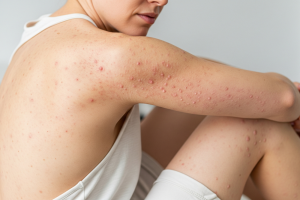 Eczema is a prevalent skin condition that affects millions of individuals worldwide, characterized by inflammation, itchiness, and discomfort. This chronic ailment can manifest in various forms, each with its unique triggers and symptoms. Understanding eczema is crucial for effective management and treatment. This article delves into the symptoms, diagnosis, and treatment options available for eczema, providing a comprehensive overview for those affected by this condition.
Eczema is a prevalent skin condition that affects millions of individuals worldwide, characterized by inflammation, itchiness, and discomfort. This chronic ailment can manifest in various forms, each with its unique triggers and symptoms. Understanding eczema is crucial for effective management and treatment. This article delves into the symptoms, diagnosis, and treatment options available for eczema, providing a comprehensive overview for those affected by this condition.
What is Eczema?
Eczema, also known as dermatitis, refers to a group of inflammatory skin disorders that lead to dry, itchy, and inflamed skin. The most common type is atopic dermatitis, which often begins in childhood but can persist into adulthood. Eczema is not contagious, meaning it cannot be spread from person to person. The exact cause of eczema remains unclear, but it is believed to result from a combination of genetic and environmental factors.
Types of Eczema
Eczema encompasses several distinct types, each with its own characteristics:
-
- Atopic Dermatitis: The most common form, often associated with other allergic conditions like asthma and hay fever.
- Contact Dermatitis: Triggered by direct contact with irritants or allergens, leading to localized skin reactions.
- Dyshidrotic Eczema: Characterized by small, itchy blisters on the hands and feet, often exacerbated by stress or exposure to certain metals.
- Nummular Eczema: Appears as coin-shaped patches of irritated skin, often following skin injuries.
- Seborrheic Dermatitis: Affects oily areas of the body, such as the scalp and face, commonly known as dandruff in adults.
- Stasis Dermatitis: Occurs in the lower legs due to poor circulation, leading to swelling and skin changes.
Understanding the specific type of eczema is essential for effective treatment and management.
Symptoms of Eczema
Eczema symptoms can vary widely among individuals and may change over time. Common symptoms include:
- Itching: Often the first sign, itching can be severe and may worsen at night.
- Red or Brown Patches: Skin may appear red, brown, or gray, depending on skin tone.
- Dry, Cracked Skin: Affected areas may become dry and flaky, leading to discomfort.
- Thickened Skin: Chronic scratching can cause the skin to thicken and become leathery.
- Oozing or Crusting: In some cases, blisters may form and ooze, leading to crusty patches.
Symptoms in Different Age Groups
-
- Infants: Eczema often appears on the face, scalp, and body, leading to oozing and crusting.
- Children: Commonly found in the creases of elbows and knees, the rash may become scaly and dry.
- Adults: Eczema may affect the face, hands, and other areas, leading to thickened, dry skin.
Recognizing these symptoms early can help in seeking appropriate treatment.
Diagnosis of Eczema
Diagnosing eczema typically involves a thorough examination by a healthcare provider. The process may include:
- Medical History: Discussing symptoms, family history of allergies, and any known triggers.
- Physical Examination: A close inspection of the skin to identify characteristic signs of eczema.
- Allergy Testing: In some cases, allergy tests may be conducted to identify specific allergens that could be triggering symptoms.
Importance of Accurate Diagnosis
An accurate diagnosis is crucial for effective management. Misdiagnosis can lead to inappropriate treatments, worsening symptoms, and unnecessary discomfort. Consulting a dermatologist can provide specialized insights into the condition.
Treatment Options for Eczema
While there is no cure for eczema, various treatment options can help manage symptoms and reduce flare-ups. Treatment plans may include:
Topical Treatments
-
- Moisturizers: Regular application of emollients helps maintain skin hydration and barrier function.
- Corticosteroids: Topical steroids can reduce inflammation and itching during flare-ups.
- Calcineurin Inhibitors: Non-steroidal creams like tacrolimus and pimecrolimus can help manage symptoms without the side effects of steroids.
Oral Medications
In more severe cases, oral medications may be prescribed, including:
-
- Antihistamines: To alleviate itching and improve sleep.
- Corticosteroids: Systemic steroids may be used for short periods to control severe inflammation.
- Immunosuppressants: Medications like cyclosporine can help regulate the immune response.
Phototherapy
Light therapy involves exposing the skin to controlled amounts of natural or artificial light. This treatment can be effective for moderate to severe eczema that does not respond to topical treatments.
Lifestyle Modifications
In addition to medical treatments, lifestyle changes can significantly impact eczema management:
-
- Avoiding Triggers: Identifying and avoiding known irritants or allergens can help prevent flare-ups.
- Stress Management: Techniques such as yoga, meditation, and regular exercise can reduce stress, which may trigger symptoms.
- Dietary Considerations: Some individuals may benefit from an anti-inflammatory diet, avoiding foods that trigger allergic reactions.
Living with Eczema
Managing eczema requires ongoing care and attention. Here are some strategies to help individuals cope with the condition:
Daily Skin Care Routine
Establishing a consistent skincare routine is essential. This includes:
-
- Regular Moisturization: Applying moisturizer at least twice daily, especially after bathing.
- Gentle Cleansing: Using mild, fragrance-free cleansers to avoid irritation.
- Avoiding Hot Showers: Opting for lukewarm water to prevent further drying of the skin.
Clothing Choices
Wearing soft, breathable fabrics can minimize irritation. Avoiding rough materials like wool and opting for cotton can help keep the skin comfortable.
Monitoring Mental Health
Eczema can take a toll on mental well-being. Seeking support from mental health professionals or support groups can provide valuable coping strategies.
Eczema Complications
While eczema itself is not life-threatening, it can lead to complications if not managed properly. Potential complications include:
- Skin Infections: Scratching can break the skin barrier, increasing the risk of bacterial or viral infections.
- Asthma and Allergies: Individuals with eczema are at a higher risk of developing asthma and other allergic conditions.
- Skin Discoloration: Prolonged eczema can lead to changes in skin pigmentation, resulting in lighter or darker patches.
When to Seek Medical Attention
It is essential to consult a healthcare provider if symptoms worsen, if there are signs of infection (such as fever or increased redness), or if current treatments are ineffective.
Eczema is a complex condition that requires a multifaceted approach to management. By understanding the symptoms, seeking an accurate diagnosis, and implementing effective treatment strategies, individuals can significantly improve their quality of life. Ongoing research continues to shed light on this condition, offering hope for more effective treatments in the future. If you or someone you know is struggling with eczema, don’t hesitate to reach out to a healthcare professional for guidance and support.
We help Patients with Eczema
General Dermatology encompasses the complete range of disease and conditions of skin, hair and nails. Our goal is to help each of our patients achieve healthy, beautiful skin through proper skin care, skin surveillance, and accurate diagnosis and treatment of skin disease.
> Learn More
Contact Us (859) 283-1033 for a Consultation
—
 About Dermatology Associates of Northern Kentucky
About Dermatology Associates of Northern Kentucky
Dermatology Associates of Northern Kentucky offers a range of services for all age groups, including general and pediatric dermatology, dermatologic surgery, Mohs Micrographic surgery, laser and cosmetic procedures, and Dermatopathology.
> Learn More

 About Dermatology Associates of Northern Kentucky
About Dermatology Associates of Northern Kentucky